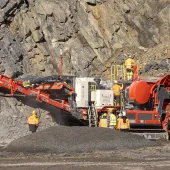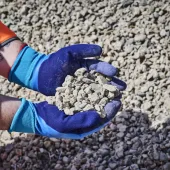Sandvik introduce industry-first ‘opt-out’ carbide recycling
Company aiming to collect and recycle 90% of its own used cemented carbide drill bits by 2025
SANDVIK are introducing an industry-first ‘opt-out’ recycling programme for customers of carbide drill bits. The initiative aims to transform the use of a material expected to run out within 40 to 100 years if consumption rates continue unabated.
Tungsten, a key component in cemented carbide, is a scarce and finite material. Making tools from recycled carbide requires 70% less energy and emits 64% less CO2. It also reduces nitrous oxide emissions.
Sandvik say they aim to collect 90% of their own used drill bits by 2025. Other manufacturers’ used bits can also be recycled within the scope of the new initiative.
‘Our breakthrough opt-out programme supports our customers’ drive to operate more sustainably and demonstrates our commitment to delivering on Sandvik’s ambitious sustainability goals to halve CO2 emissions by 2030,’ said Jens Holmberg, president of Sandvik Mining and Rock Solutions’ Rock Tools division.
‘We are determined to lead the industry into a new era, fully committed to embed circularity across an essential component of mining.’
Historically, carbide recycling has faced several challenges. Collection of used products has been limited while carbide extraction has been cumbersome, inefficient and involved hazardous ways of working.
Sandvik are now able to help customers overcome these challenges through their new opt-out programme.
‘Customer response has been overwhelmingly positive,’ said Mr Holmberg. ‘We need to transition our industry at an unprecedented speed. Our recycling programme is one of many new initiatives you will see from Sandvik’s Rock Tools division moving forward.’
Further underlining the importance of cemented carbide recycling, Sandvik say they are the first in the industry to their customers carbide extraction support. This will make it easier, faster and safer to recycle dull drill bits with a new patent-pending method that will reduce emissions from transportation by 93%.










